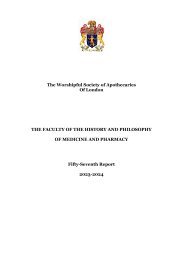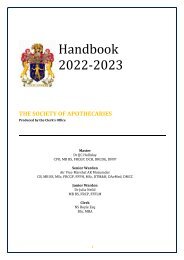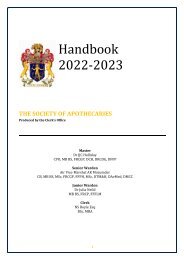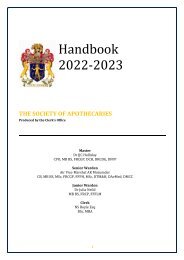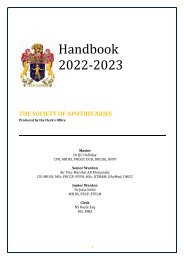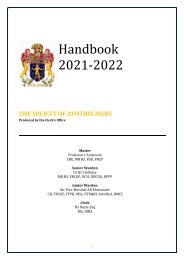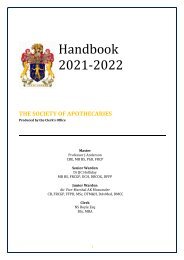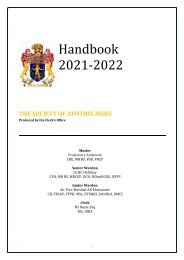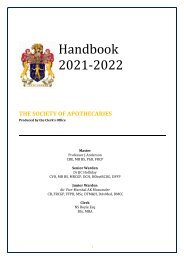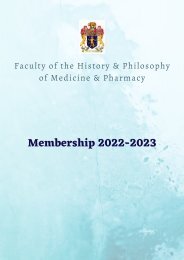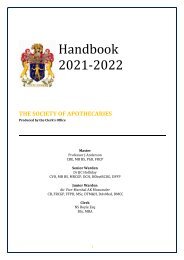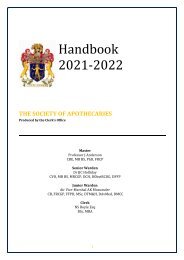Apothercary 2016
Journal of the Worshipful Society of Apothecaries, Society year 15-16
Journal of the Worshipful Society of Apothecaries, Society year 15-16
Create successful ePaper yourself
Turn your PDF publications into a flip-book with our unique Google optimized e-Paper software.
Faculty of Conflict and Catastrophe Medicine<br />
Air Vice-Marshal Aroop Mozumder<br />
CB FRCGP FFPH MSc DTM&H DAvMed DMCC<br />
Last year I opened by mentioning that the relevance of<br />
what we teach and examine in this Faculty has perhaps<br />
never been so starkly exposed, highlighting the brutal<br />
civil war in Syria. The world now is, if anything, in an<br />
even worse position than last year, with a larger number<br />
of humanitarian emergencies, fragile and failing states,<br />
and mass movements of refugees and internally<br />
displaced people than in recent memory. Although<br />
some progress has been made worldwide in the<br />
Millennium Development Goals (now the Sustainable<br />
Development Goals) and towards the control of diseases<br />
such as malaria, TB and polio, it is still shocking to think<br />
that 15 of the 20 poorest<br />
countries in the world are<br />
still affected by significant<br />
conflict. We are being<br />
daily exposed to pictures<br />
of suffering on our TV<br />
screens. This is perhaps<br />
one of the reasons for the<br />
popularity of our course<br />
and why more medical<br />
schools have also<br />
expressed an interest in<br />
this area of medicine.<br />
Care of displaced<br />
populations and the<br />
wider health issues facing<br />
societies dealing with<br />
health emergencies, is a<br />
core part of what we teach<br />
to doctors and nurses on<br />
the Conflict & Catastrophe Medicine course. Indeed, so<br />
popular has the course become, that last year we had to<br />
very reluctantly declare the course numbers at capacity<br />
for the first time. We introduced a ceiling of 50 new<br />
students for each course year starting in January. With<br />
39<br />
over 280 students enrolled, the Saturday lectures are<br />
lively and busy, with often around 70 students<br />
attending. We are now full at the time of writing for the<br />
courses in 2017 and 2018 and the waiting list on the 2019<br />
course is also significant and well over 30. Although<br />
gratifying, in one sense this is also deeply worrying, in<br />
that we are clearly not able to fulfill the demand among<br />
young and enthusiastic healthcare professionals for<br />
teaching in this area.<br />
Due to the importance of evolving the syllabus to<br />
keep up with the requirement to deliver a relevant and<br />
up-to-date course, we increased the number of teaching<br />
days to 13 Saturdays per<br />
year. Course days are<br />
lively and busy and it is<br />
wonderful to see so many<br />
motivated students in<br />
our venerable Hall. This<br />
success is once again due<br />
to the very hard work of<br />
our Course Director Dr<br />
Tim Healing and our<br />
Faculty administrator<br />
Goldy Gullo.<br />
Our evening public<br />
lectures have been once<br />
again excellent this year.<br />
In May we had an<br />
innovative three-part<br />
briefing on the Ebola<br />
Briefing in the Great Hall<br />
crisis in West Africa last<br />
year, given by three of<br />
our distinguished Apothecaries, Dr Tim Healing<br />
(Course Director), Professor Richard Williams (DMCC<br />
Convenor) and Dr Gordon Gancz (DMCC Examiner).<br />
They spoke eloquently and knowledgeably on the<br />
epidemiology and control of the disease, the



